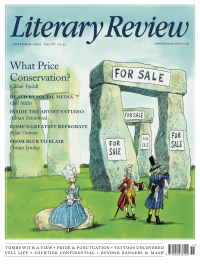James Campbell
A Butcher’s Trade
When I began working at the Times Literary Supplement in the 1980s, an older colleague would hand me a piece of typewritten copy, pristine just an hour before but now heavily marked in pencil, with the faux-solemn words: ‘Here is the bleeding corpse. Yours is a butcher’s trade.’
The source of the remark was said to be a letter from Henry James to Bruce Richmond, the second editor of the TLS, enclosed with the proofs of his piece on Balzac, which James was returning. In the years before his death in 1916, James wrote several articles for the paper. Richmond had the reputation of being a severe editor. James was not alone in seeing his creation cut, chopped, boned – whichever butcherly term you prefer. Even the best reviewers come to accept it as part of the process. The 22-year-old Virginia Stephen’s first attempt at a review in 1904 was turned down, with an explanation from the editor that his preferred style was more ‘academic’ (she made it in with her second effort, and as Virginia Woolf became a prolific contributor). Paying tribute to Richmond in 1961, T S Eliot recalled that he ‘did not hesitate to object or delete’. Like others at the sharp end of the pencil, Eliot flinched at times, but he concluded on reflection, ‘I had always to admit that he was right.’
As if to emphasise their submission to the greater good of providing intellectual nourishment to the nation, neither Woolf nor Eliot had the pleasure of being published in the paper under their own names (James was sometimes allowed a byline). A butcher’s trade indeed.
Over the years, James’s phrase gained a life of its own among sub-editors. It might even be taken as justification for laying into something by a well-known figure of our own day that had failed to live up to expectation. ‘Ours is a butcher’s trade’ – and down

Sign Up to our newsletter
Receive free articles, highlights from the archive, news, details of prizes, and much more.@Lit_Review
Follow Literary Review on Twitter
Twitter Feed
Johannes Gutenberg cut corners at every turn when putting together his bible. How, then, did his creation achieve such renown?
@JosephHone_ investigates.
Joseph Hone - Start the Presses!
Joseph Hone: Start the Presses! - Johannes Gutenberg: A Biography in Books by Eric Marshall White
literaryreview.co.uk
Convinced of her own brilliance, Gertrude Stein wished to be ‘as popular as Gilbert and Sullivan’ and laboured tirelessly to ensure that her celebrity would outlive her.
@sophieolive examines the real Stein.
Sophie Oliver - The Once & Future Genius
Sophie Oliver: The Once & Future Genius - Gertrude Stein: An Afterlife by Francesca Wade
literaryreview.co.uk
Princess Diana was adored and scorned, idolised, canonised and chastised.
Why, asks @NshShulman, was everyone mad about Diana?
Find out in the May issue of Literary Review, out now.
Literary Review - For People Who Devour Books
In the Current Issue: Nicola Shulman on Princess Diana * Sophie Oliver on Gertrude Stein * Costica Bradatan on P...
literaryreview.co.uk